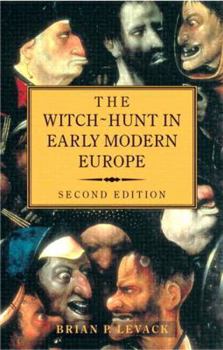The Witch-Hunt in Early Modern Europe
Select Format
Select Condition 
Book Overview
The Witch-Hunt in Early Modern Europe, now in its fourth edition, is the perfect resource for both students and scholars of the witch-hunts written by one of the leading names in the field. For those... This description may be from another edition of this product.
Format:Paperback
Language:English
ISBN:058208069X
ISBN13:9780582080690
Release Date:April 1995
Publisher:Pearson
Length:312 Pages
Weight:0.90 lbs.
Dimensions:0.7" x 5.5" x 8.4"
Customer Reviews
4 ratings
A must read
Published by Thriftbooks.com User , 17 years ago
I really liked this book. Brian Levack is a top historian on the subject and therefore he has other books out there on it. However, this book is short and gives a good overview of the witch hunts in early modern Europe. He focuses on what they were and a little bit on why he thinks they occurred. It's a good overview on the subject but if you are looking for something more thorough, then this is not for you.
The Destructiveness of Believing in Feverish and Fearful Fantasies
Published by Thriftbooks.com User , 17 years ago
This is a thorough and objective examination of the witch hunts. There are no sensational distortions presented here, just the facts. It's well organized and easy to read. People who were accused of witchcraft were mostly old women that often took care of children or were out begging for money, which annoyed others or made them feel guilty. If a child died and she had cared for it, there was always a chance that she would be accused of killing the child by witchcraft. People believed that misfortune was often caused by the devil and witchcraft in early modern Europe. So if the crops failed, if you or a loved one fell ill, or if a child died, blaming a witch was a convenient thing to do. Not only peasants but the educated believed in witchcraft. They often bolstered their fantasies with elaborate demonological theories. Amusingly, they had this idea that people would ride off into the air to some remote place to bend over backwards and kiss the devil's bum and give themselves over to Satan. Witchcraft accusations often grow in times when people feel uneasy about radical changes in society, morality, religion, and the economy. If wages are getting lower, prices are getting higher, and there's rebellion against the old order, the devil must be on the loose. Witch hunts often happened more in societies that had provincial, local governments that had no oversight from central governments. Germany with its many small provinces was a hot spot for witch hunts and executions. Thousands of people were executed in early modern Europe, not millions, as some claim. Even white witchcraft could be prosecuted because people thought that if one had the ability to heal, you also had the ability to kill. Although some people have always practiced black magic, almost all the people accused of witchcraft were innocent and many of the accusations expressed diabolical fantasies. Witch hunts declined when educated people started to have less spiritual, and more skeptical, materialistic worldviews which lead to the legal system refusing to prosecute witchcraft cases. Witchcraft cases still crop up from time to time today. Most recently in America, childcare workers have been accused of doing diabolical things to children. Most cases have been dropped because they depend on accusations from children who are coaxed into giving outrageous answers or it is realized that children have difficulty distinguishing reality from fantasy. Anyone who has worked with kids knows that it is pretty easy to get accused of something that you didn't do. This is the case especially with girls. In fact, a lot of chain reaction witch hunts were started by the false accusations of children in early modern Europe. On a side note, Africa is still known to have "witch" lynchings, especially since the colonial governments have left with their modern skeptical views toward witchcraft. Black Africans often believe strongly in magic and witchcraft. Although I still believe that nefarious wi
Very scholorly
Published by Thriftbooks.com User , 21 years ago
I am taking Mr. Levack's classat UT, and of course this book is required reading. Regardless I would probably have gotten the book sooner or later. It is AMAZING. Extremely detailed, delves into both the magical and legal proceedings on the Witch hunt. The focus is on WHY something like this happened, and I feel Mr. Levack is incredibly inciteful in his ideas.
Best Summary of Modern Research
Published by Thriftbooks.com User , 25 years ago
During the 70's and 80's, a flood of new information on historical witchcraft became available. Levack's book is the best survey of this new data, which has revolutionized our understanding of the Great Hunt. It's not a very "daring" book; it sticks to the facts, to the things we're sure about. There isn't a lot of speculation in it. But it's a great antidote to the badly researched books, like Anne Barstow's _Witchcraze_, which flood the popular market.





